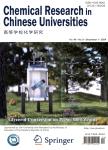Expression and Characterization of Human Heart Type Fatty Acid Binding Protein in Pichia Pastoris
Expression and Characterization of Human Heart Type Fatty Acid Binding Protein in Pichia Pastoris作者机构:Pharmacy College of Jilin University The First Hospital of Jilin University Changchun 130021 P. R. China Changchun University of Science and Technology Changchun 130021 P. R. China
出 版 物:《Chemical Research in Chinese Universities》 (高等学校化学研究(英文版))
年 卷 期:2006年第22卷第2期
页 面:157-161页
核心收录:
学科分类:1007[医学-药学(可授医学、理学学位)] 10[医学]
基 金:SupportedbytheSocialDevelopmentProjectofScienceandTechnologyDepartmentofJilinProvince China(No.20030450)
主 题:Human heart type fatty acid binding protein Expression and purification Pichia
摘 要:H-FABP is regarded as a tissue-specific protein existing only in myocardial cells. It is released from the cardiac tissue and gets into the plasma when a heart attack occurs; the myocardial infarction is a good case in point. As a resuit, the detection of H-FABP will be an early and important biomarker for the disease concerned. The objective of the study is to prepare the recombinant H-FABP by aeukaryotic expression system, pichia, to produce the protein mimicking natural H-FABP, as an immunogen for the production of the specific antibody. A gene fragment encoding H-FABP was cloned in the expressing vector pPICZα, after sequencing. The recombinant plasmid was transformed into the competent cells of the X-33 strain by means of electroporation. The expression of the target peptide induced by methanol was screened by means of Western hlotting, with the available MAb(Clone 6B6). Highly expressive engineer strains were obtained. The production of recombinant H-FABP under induction was about 0.7 g/L, with an Mr of 14.5 kDa and recognized by a commercially available MAb (Clone 6B6). The recombinant vector was successfully constructed. Following this, H-FABP was expressed in X-33, and it would become the source of the preparation of specific antibodies, to develop diagnostic kits.



